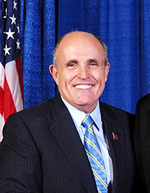According to the comic book publisher Marvel, the bleak, corrupt and crime-laden Gotham City, home of Batman, was downtown Manhattan on a rainy night. That definition was coined in the 1930s. By the the 1970s and 1980s, however, it could apply to pretty much all of Manhattan. Even key spots like Times Square were filled to the brim with drug addicts and prostitutes.
With all due respect to the African Congo, New York back then must have been one of the most violent, hostile places in the world.

There were several reasons for this decay. There had been a good-hearted, yet misguided policy that released the patients from mental hospitals, under a slogan that claimed they could be "good neighbors". Which is largely true. It's just that these people could act strangely when they didn't take their medication. Namely, they could go on a shooting rampage, attack people with a machete on the Staten Island Ferry or throw them to the subway tracks. Between 1990 and 1997, incidents caused by the mentally ill averaged 34 a year. Before that, the average was 23.
But mainly, there was the economic crisis -- it had shaken the world in the 1970s but only reached Wall Street in the late 1980s, burdening New Yorkers until halfway through the first Bush's administration. This prompted the lower classes to seek input from different places. Which led to the crack epidemic.
The surge of this particularly pure and cheap brand of cocaine saw young, hopeless bums acquiring easy money. This made them fiercely protective of their turfs. Gunshots were as frequent as honking car horns in those years. New York City was home to about 2,300 violent deaths a a year. That's six murders a day. That was too much even for the capital of the world. People were leaving, to either the emerging communities of the South of the U.S. or even New Jersey.
Luckily for the city, there was Rudolph Giuliani.

Rudy Giuliani is key to understanding modern-day New York. After all, he saved it twice. As usual with such men, his biography is not exempt from dark corners. In fact, under different circumstances, he could have been considered a public menace. Like Winston Churchill, in a way. But, not unlike him, he knew where to be to best serve his community.
The Giuliani family arrived in New York from Tuscany in the 19th century. Rudolph's father was a distinctly unlucky man. He boasted all the physical requirements to be a great boxer. He was fit, broad-backed and had great reflexes. But he was also burdened with a significant amount of diopters in each eye. Since he could not jump into a ring with his glasses on nor could he fight blindly, he quit boxing and tried delinquency. It was not an improvement. He was caught during his first robbery and sent to Sing-Sing prison for two years. When he came out he found employment as a hitman for the mob.
Rudolph Giuliani was born on May 28, 1944. He was raised in Brooklyn -- a neighborhood where baseball and the Dodgers were two sides of the same religion. He was a Yankees fan, which is a good indication of his personality. He managed to go to college thanks to the money that some relatives sent to him. Among them, a mobster.
In any case, he graduated cum laude in 1968 and, following his then-admired Bobby Kennedy, he joined the Department of Justice. He also married his cousin, Regina Peruggi. When Ronald Reagan was elected president, he conveniently changed his affiliation to Republican. It wasn't a bad idea considering how, in 1973, he was named Chief of the Narcotics Unit and became executive U.S. attorney.
He was assigned the thankless task of solving the Haitian immigrant crisis: in Haiti, hundreds of thousands were escaping Jean Claude Baby Doc Duvalier's dictatorship and flocking to American soils. Rudy decided to put the newcomers into concentration camps. He systematically separated the families: men on one side, women on the other. He reasoned that if they were put together, the men would rape the women. Reagan liked this tough guy.
He liked him so much, in fact, that he offered him the Attorney's Office for the Southern District of New York. This means he controlled the Lower East and Wall Street. The mobsters and the three-piece-suit sharks. Giuliani -- who by then had annulled his marriage to Regina (because good Catholics don't divorce) and married a reporter from California -- became a new Elliot Ness.
His crusades against the mafia and the financial criminals were spectacularly lauded by the press and welcomed by the public. Among his major achievements were the arrests of the Genovese and Colombo mafia families, and the arrest of Ivan Boesky, a broker who, suffice it to say, was the inspiration for Michael Douglas' Gordon Gekko in the 1987 movie Wall Street.
His crimebusting trajectory was so ebullient that when he stepped down, on January 1989, the New York Post said, "Good news for bad guys".

The triumphant Giuliani, the man who personified law itself, then announced he would run for major. In the following months he would prove to be a pathetic candidate. Children cried when he tried to kiss them. He would yell at citizens in the middle of his electoral visits. His rival, David Dinkins -- whose biggest assets were being African American and an all-around nice guy -- beat him by 44,000 votes.
However, in 1992 he still had enough adoration from reporters to try again. No children and no visits this time. He decided to do what he did best and to promise what only he could deliver -- law enforcement and an iron fist. That was a different thing. He won the election and became New York's chaperone.
Basically, he imprisoned as many people as he could. His "zero tolerance" policy led him to fill New York's jails to the brim, hire 2,400 new police agents, fire every "liberal" working at City Hall and allow his army of agents to do whatever it took to stop crime.
(Let's stop for a minute and remember the story of Abner Louima who, as part of his interrogation, was sodomized with a broomstick and a plunger until his colon and bladder were badly damaged. There was also Amadou Diallo, who was killed by 17 of the 47 shots fired at him by policemen because the way he was reaching for his wallet looked "suspicious".)
The Giuliani regime saw hundreds of abuses. But the city changed. In 1993, the average of violent deaths per year was around 2,000. In 1997 it had dropped to 500. People started to inhabit Midtown again. Times Square stopped being such a dangerous, sordid (albeit fascinating) place and became the world's aorta again. Right now, New York is even safer than other cities in America.
It was a spectacular resurrection.